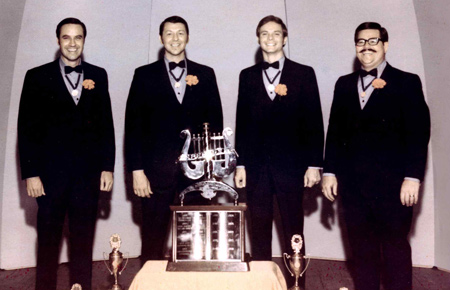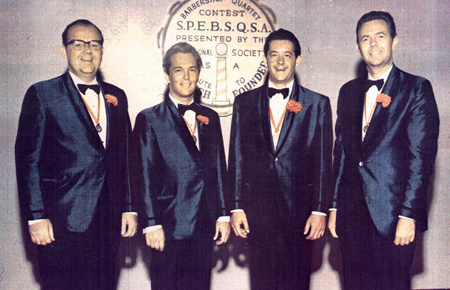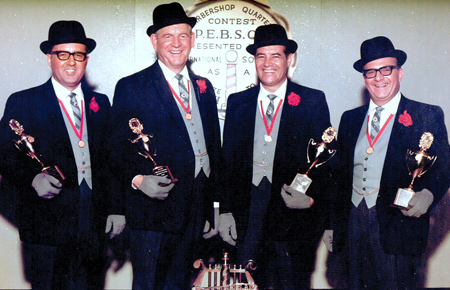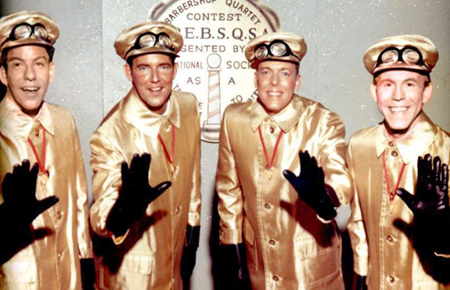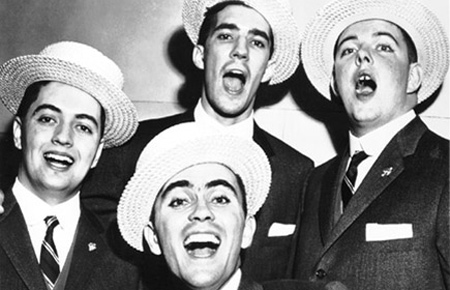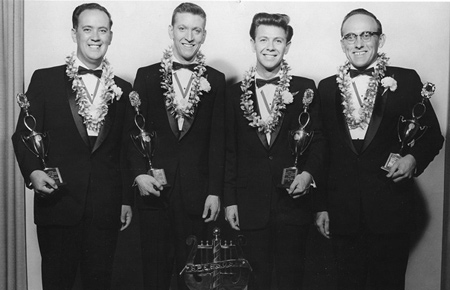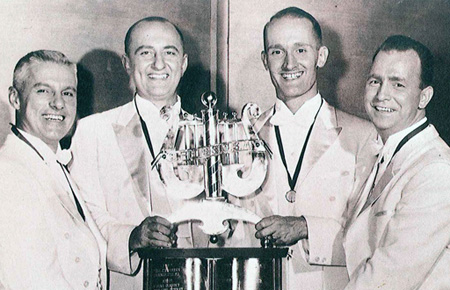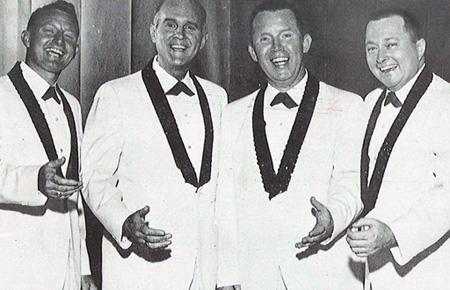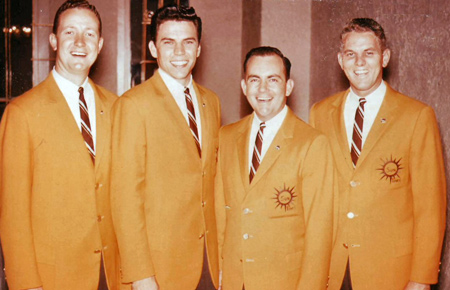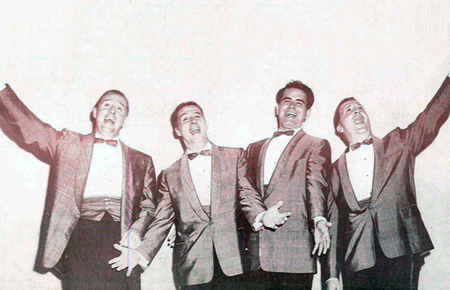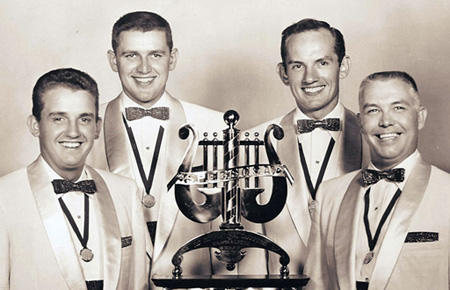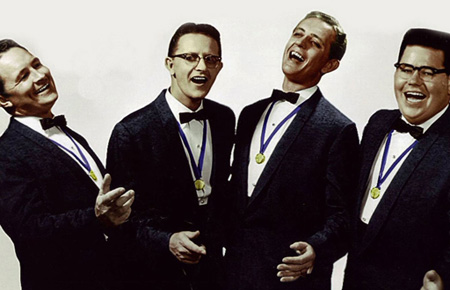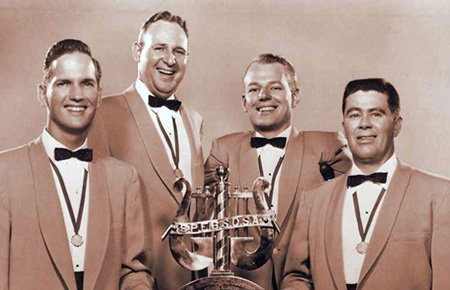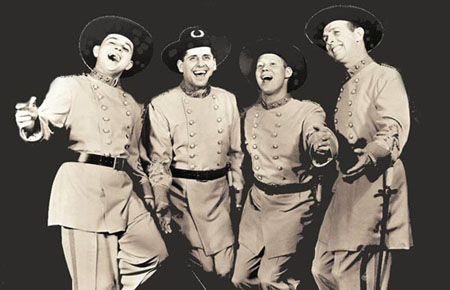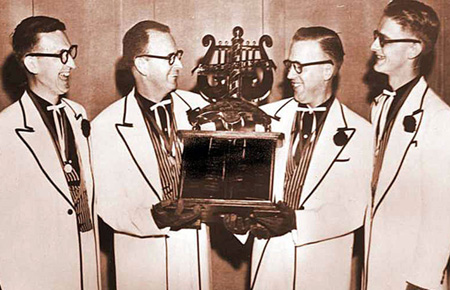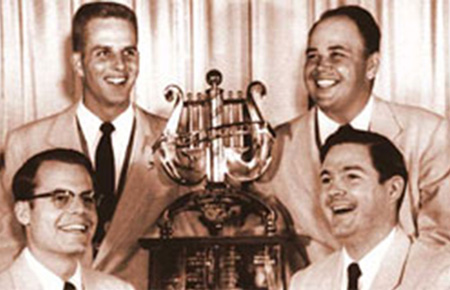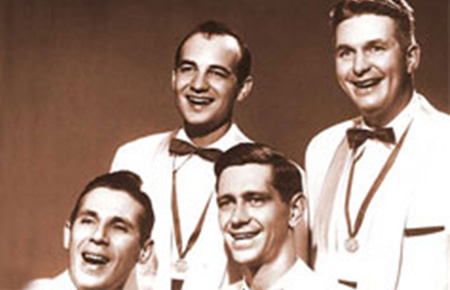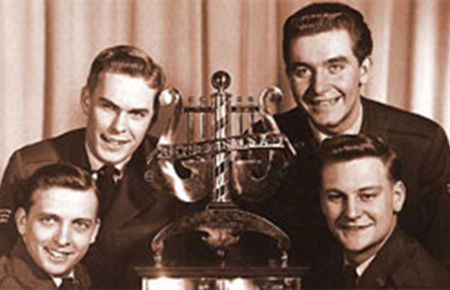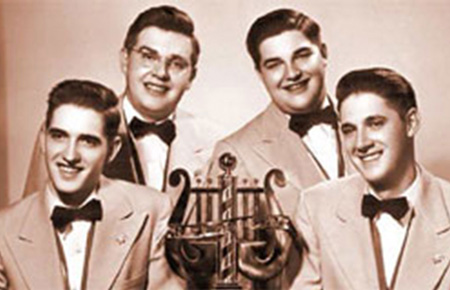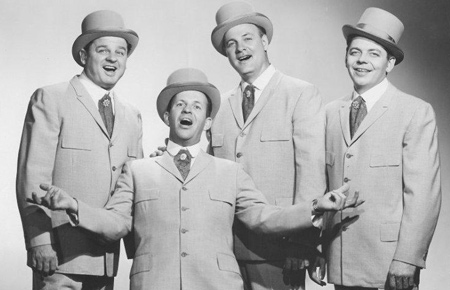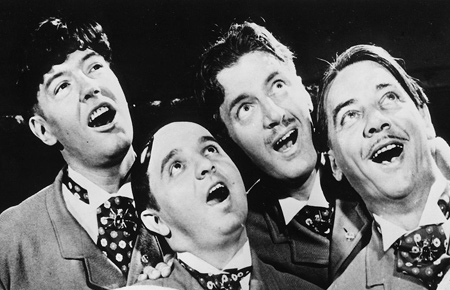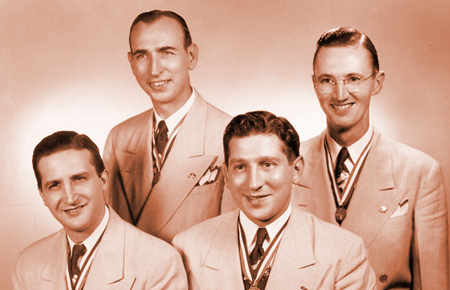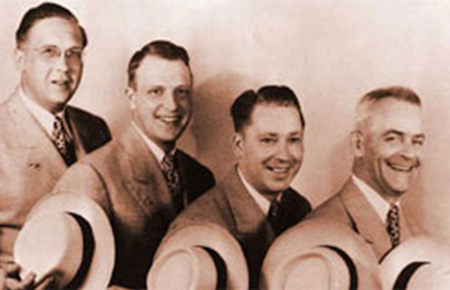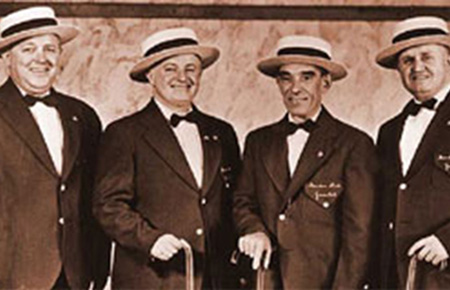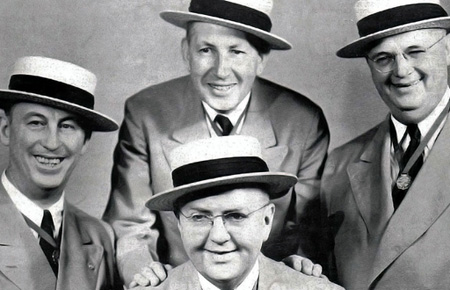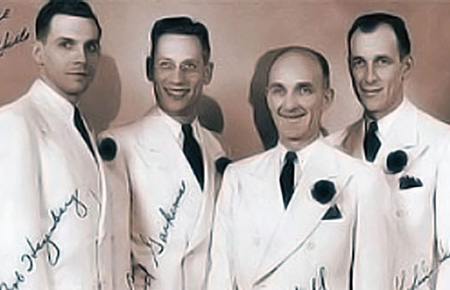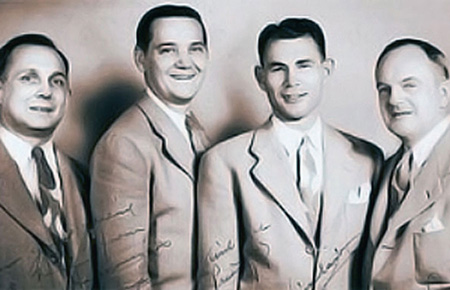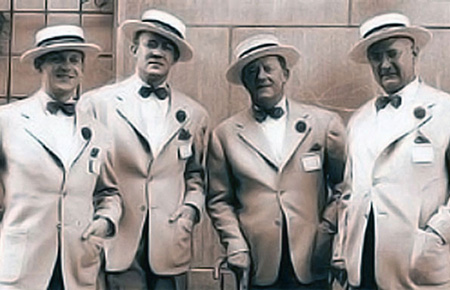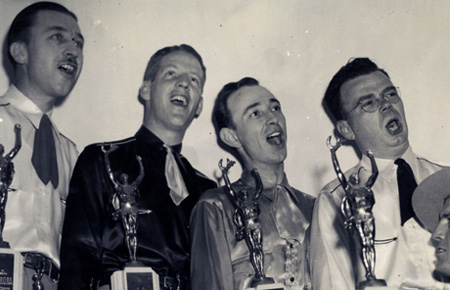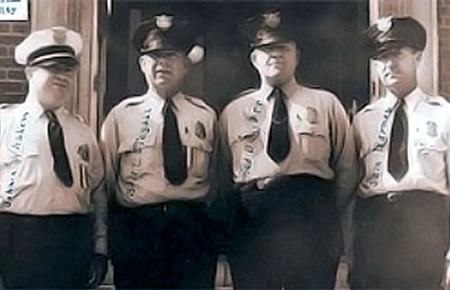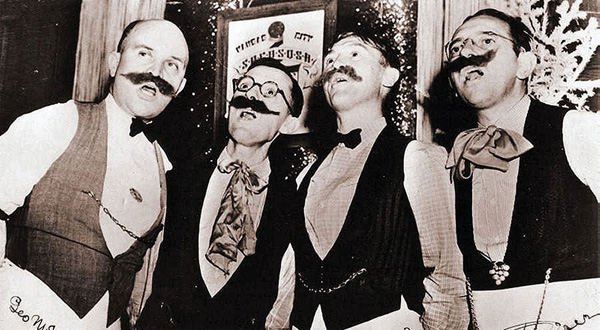In Celebration of the Human Voice - The Essential Musical Instrument
Home | Doo Wop | Barbershop | World | Contemporary | Christian | Vocal Jazz | Choral | Christmas | Instructional | Arrangements
Classical | Opera | Musicals | Personality | Young Singers | Disney | Videos | Songs | The Artists

Barbershop Quartet International Champions
Originally a uniquely American art form barbershop harmony singing has spread around the world with top notch groups performing all over. The joy of singing together helps create a camaraderie that's hard to beat and tens of thousands of men are participating in quartets and chorus. Here is a list of the gold medal winners of the annual competition.
Displaying 51 - 81 of 81 items.
1969 : Mark IV
Many personnel changes, some of them brought about by Uncle Sam, brought together the talented foursome that won the Gold in St. Louis in 1969. Mo Rector, fine bass of the '58 champs, the Gaynotes, baritone Dale Deiser, lead Alan Koberstein, and tenor Franklin Spears were years ahead of their time in finesse, warm rich sound, and overall musicianship. They only stayed together until 1974, pleasing audiences with their music and gracious personalities; but we are left with this masterpiece cd. Pure entertainment, from 'Anything Goes' and 'Daddy Sang Bass,' to 'Every Step Of The Way' and 'If You Love Me, Really Love Me.' 22 songs in all, a generous helping of the stuff barbershop is made of, the top of the Mark!
1968 : Western Continentals
A funny thing happened to the Western Continentals on their way to the 1968 International championship. In 1965, only a year after they first got together, Dr. Curt Kimball, Ted Bradshaw, Paul Graham and Terry Diedrich placed eighth in the International competition.v
Then Curt, the tenor, was called to service in Vietnam and was replaced by Al Mau. They dropped to 21st in '66. They went to Los Angeles in '67, not only with Al but with a new bass, Phil Foote, replacing Terry. They won the silver medals. The next year, in Cincinnati, they captured the gold.
1967 : Four Statesmen
Members of the Four Statesmen began quartet singing as early as 1945. The first International appearance was in 1964, where they placed twelfth. Following their win in 1967, they kept singing, with appearances on the Mike Douglas TV show and tours that took them as far abroad as England, France and Italy. The 27 songs on this recording include the sentimental - 'Try To Remember,' 'Climb Every Mountain' and ' I Miss You Most Of All' are just a few - as well as the lighthearted: 'I've Got The Time, I've Got The Place, But It's Hard To Get The Girl' and 'Crazy Bones Skeleton Ball.' Our favorite: 'Raindrops Keep Falling On My Head,' with a beautifully-harmonized refrain.
1966 : Auto Towners
While several barbershop quartets have gone on to professional careers (the Hi-Los, Four Freshmen and Osmond Brothers, for example) the Auto Towners, 1966 International champions from the Detroit area, drew at least one of its members from a professional singing group.
Baritone Clint Bostick in the early 1950s was with the "Spellbinders", a mixed quintet that sang for two years on the Patty Paige television show, appeared for 13 weeks each on the Vic Damone and Tony Bennett shows and sang for 17 weeks with Judy Garland at the Palace Theater in New York City.
1965 : Four Renegades
Formed in 1956, the Four Renegades slowly rose in International competitions until winning it all by 450 points in Boston, 1965. At that point they were: Bass, Tom Felger, Baritone, Jim Foley, Lead, Ben Williams and Tenor Buzz Haeger. There are 30 songs, and it's hard to tell who's having more fun, the group or the audience. Want funny? Listen to 'Mr. Bassman.' Poignant? 'The Little Boy.' Rousing? 'Waiting for the Robert E. Lee.' Spiritual? 'The Lord's Prayer.' The Renegades were funny, they sang great, they had class, and they were tremendous barbershop ambassadors. It adds up to a CD that's big fun!
1964 : Sidewinders
Saturday, June 27, 1964, undoubtedly was the happiest day in the history of the Riverside, CA chapter. On that day the Riverside Citrus Belters chorus won 5th place bronze medals in its first International competition. And four chapter leaders, a group known as the Sidewinders, became the new International quartet champions. Some championship quartets, by necessity or by choice, have not always been strong members of the chapters to which they belonged. Not the Sidewinders. Tenor Jerry Fairchild had long been chorus director. Lead Joe Daniels had been president and was about to be named to that post again. Bass Jay Wright was three-term secretary. Bari Gene Boyd was past membership vice president, show chairman, and perennial committee member.
1963 : Town and Country Four
After winning the 1958 Johnny Appleseed District Quartet Championship and a third-place International bronze medal in 1959, the Town & Country Four distinguished itself as the first Barbershop Harmony Society-quartet to go on to win its gold medals after having won three consecutive silver (second-place) medals in the years 1960, '61 and '62.
1962 : Gala Lads
"Experienced" - and proving it - might best describe the members of the 1962 International quartet champion, The Gala Lads from Alhambra, CA.
While a few gold medalists have been young and won while in their teens, the Gala Lads averaged 36 years of age when they won the championship. Tenor Dave Panther was 28, lead Tom Keehan 35, bari Gordie Lees 36, and bass Bill Cockrell 45.
1961 : Suntones
The Suntones began singing in 1957 with Gene Cokeroft on tenor, Clark Bell singing lead, Bill Wyatt on baritone and Danny Whipple on bass. Wyatt wrote wild and crazy arrangements of songs like That Old Black Magic. In addition to singing barbershop, the quartet enjoyed singing "Hi-Lo's" songs and was known for their ability to tune chords.
Families and draft boards took their toll on original members and forced some personnel changes. In November of 1958 the Suntones were looking for a new bass, when into a chapter meeting wandered Bill Cain. He sang a song with Gene, Bill and Bob Franklin. The sound was so impressive they rehearsed nine nights in a row and entered the district contest. They were the surprise of the weekend, coming in second. The very next year, the quartet won the first district quartet championship of the newly formed Sunshine District. It was that weekend they met baritone Harlan Wilson. Their first exposure to the International Convention audience was in 1959 in Chicago where they placed 24th despite Bob having the flu.
1960 : Evans Quartet
Trivia question: What quartet sang Lindy, Lucky Lindy for Charles A. Lindbergh in 1927 and, with a couple of personnel changes, was still singing as an International champion 50 years later? Answer: the Evans Quartet of Salt Lake City, the 1960 gold medal winners.
The song was delivered to Lindberg as he was making a triumphal tour of the country flying his "Spirit of St. Louis." During the parade in Salt Lake City, when his motorcade passed by, four young brothers, ages 7, 9, 11, and 13, stepped out from the curb to sing, in full barbershop harmony, the popular song. Lindbergh ordered the car stopped, listened to the song, thanked them and shook their hands.
1959 : Four Pitchikers
From a high school in the heart of the Missouri Ozarks to the winners' circle onstage of the Civic Opera House in Chicago is an even longer trip than the miles indicate. The Four Pitchikers made it, though, in 1959, to become International quartet champions. But they might never have arrived if it hadn't been for a chance, once-in-a-lifetime involvement with a man who was to become one of the Society's leading arrangers and coaches.
The original Pitchikers, natives of two tiny farming communities in southwest Missouri, were high school students; Larry Hedgepeth, Keith Keltner, Keith Young and Johnny Marriott. Bitten by the barbershop bug, they joined the Heart of the Ozarks chapter and competed at a couple of district contests while still in school. They called themselves the Teen Tuners.
1958 : Gaynotes
The Society for the Preservation and Encouragement of Barbershop Harmony (SPEBSQSA) was born in Tulsa, Oklahoma, so it was no surprise when Oklahoma quartets captured the first three International (then national) crowns. But it would be 20 years after the Society's formation before the title returned to the Sooner state.
In 1958 in Columbus, Ohio, four Tulsa men called the Gaynotes won the gold medals as International champions. They were Harold Jones, tenor; Howard Rinkel, lead; John Loots, bari, and Morris "Mo" Rector, bass. Howard and John had sung in a couple of earlier quartets, including one sponsored by an ice cream company which required that they perform at least twice a week.
1957 : Lads of Enchantment
While some quartets continue singing for years as International Champions, others are forced, for one reason or another, to "hang up the pitch pipe" soon after winning the gold. The Lads of Enchantment, 1957 winners, was one of the latter.
And yet tenor Don Pitts, lead Dan Aycock, bari Carl Wright and bass Gil Wallace, all from Albuquerque, left their mark in some areas as indelibly as did the Suntones.
1956 : Confederates
"Save Your Confederate money, boys, the South shall rise again!" That song by The Confederates, 1956 International Champions, was to go down in history, and the quartet went on to become a true legend within the Society over the next 13 years. Organized at a Memphis Chapter party in September 1953. The Confederates were a popular quartet even before they won the championship. Composed of George Evans, tenor; Dave LeBonte, lead; Bill "Buz" Busby, bari; and Wally Singelton, bass; the foursome appeared in authentic looking Confederate officer uniforms, complete with dress swords, or as white-haired, frock-coated Southern "Colonels."
1955 : Four Hearsemen
In 1934, members of the Blackburn-Shaw Quartet, sponsored by a funeral home in Amarillo, TX, were paid a dollar each for singing at funerals or on the firm's Sunday radio program. Tenor Wendell Heiny joined the quartet in 1935 and was soon working full-time in the funeral business.
The quartet stayed together until World War II when three members went into the service. Heiny, along with lead Paul Ellis and bass Willard Grantham came home from the service in 1946 and started looking for a baritone. They found Dwight Elliott and in 1947 won a quartet contest sponsored by the American Legion. Two years later, Grantham dropped out of the group and was replaced by Jim Bob Nance.
1954 : Orphans
In 1950 a barbershop quartet, as yet unnamed, was to do a show in Wichita and the SPEBSQSA chapter president needed a name for the program, so he called the group 'The Orphans.' The name grew on them, and in 1954 they won District and Prelim contests, and then they were off to the Big Dance in Washington, DC. With the help of a Miracle Doctor, lead singer Bob Groom overcame the loss of his voice on their last set, and The Orphans, the pride of Wichita, were adopted-as International Champs! They wore the Gold with pride, singing nearly 60 shows a year all over the country.
1953 : Vikings
Bob Lindley, baritone; Bob Maurus, tenor; Bruce Conover, lead; and Carl Stuhr, bass were all ex-service men who liked to do a little harmonizing. All four were attending Augustana College in Rock Island, IL on the GI Bill. The year was 1946. They decided to form a quartet and made their first public performance at the college the following spring. Soon they were singing for churches and PTA meetings as well as at college gatherings.
They joined the Rock Island chapter of the barbershop harmony society in 1947 and sang in their first district contest that fall, placing third. With $25 donated by the mayor, another $25 from a local radio station, and $50 from various friends, the quartet was able to attend the international convention in Buffalo in 1949.
1952 : Four Teens
The Four Teens originated in the Eau Claire, WI Chapter in September 1949. Three members - Jim Chinnock, lead; Don Lamont, baritone; and Gene Rehberg, bass, were high school students; the fourth, tenor John Steinmetz, had graduated the previous year.
On January 8, 1950 the four young men plus a friend, Mike Egan, enlisted in the Air Force. They had decided to try to keep the quartet together and enlist as a group. The five were sent to Lackland Air Force Base near San Antonio, Texas for boot camp. There, bass Gene was found to have a foot problem and was given a medical discharge.
1951 : Schmitt Brothers
1951 Championship quartet, who went on to appearances on the Ed Sullivan show, Arthur Godfrey and more, continuing to tour and perform into the 1980's! They have selected their favorite performances for this digitally remastered CD. With a marked emphasis on the classics of the era, including 'Red Red Robin' and 'Side By Side,' the Schmitt Brothers have a honeyed tone that exemplifies barbershop's sentimental best.
1950 : Buffalo Bills
In 1947, baritone Hershel Smith, a corporate executive, and lead singer Al Shea, a policeman, got together at Smith's home in Buffalo New York with the idea of forming a barbershop quartet. Tenor Vern Reed, an executive for a boy's club, and bass Bill Spangenberg, a truck driver for a steel company were added. The quartet competed at various competitions with modest success. Shortly afterward, Smith was promoted and transferred to Madison Wisconsin, and the quartet was disbanded. Had they not reorganized, the entire face of barbershop harmony may have been vastly different than it is today.
However, Shea and Reed insisted on continuing, and they found baritone Dick Grapes. The quartet blossomed quickly, winning a national competition in 1950, and developing quite a fan club. Over the next few years, they booked many engagements and cut some records.
1949 : Mid States Four
A quartet was organized by four employees at the Bell & Howell Company. Marty Mendro, lead; Forrest Haynes, baritone; and Bob Corbett, bass. Haynes had been a member of a quartet that was one of the last to appear on the Keith road show circuit on stage and radio. Mendro, a soloist in church choirs during his younger years, was introduced to barbershop harmony at Bell & Howell during World War II. The foursome became 6th place international finalists in 1945 and 1946 and were Illinois District champions in 1946.When three of the quartet members left Bell & Howell, the group changed its name to the Mid-States Four. The president of the Mid States Insurance Company had taken an interest in the quartet and offered to sponsor them, providing uniforms and expenses in return for jobs done for his firm if they would use the corporate name.
1948 : Pittsburghers
Tommy Palamone had been in quartets and trios throughout the 1930s and '40s. One evening in 1946, he threw together a quartet and went to a meeting of the Society's Pittsburgh Chapter. The foursome-Harry Conte on tenor, Tommy at lead, his cousin Fred as bari, and "Turp" Marcanello at bass-caught the attention of Pittsburgh's premiere barbershopper, Molly Reagan. Reagan decided to coach the group, dubbed the Allen Club Four. The group dubbed the Allen Club Four. The group went to the Society's 1946 convention, where it placed a respectable sixth, but soon afterwards, "Turp" left to sing with a band and was replaced by Bill Conway on bass. Then cousin Fred left the group, and they had to find a new baritone. But the new guy backed out of a New Years' engagement at the last minute. Desperate for yet another bari, they called Jiggs Ward. Did he have a tux ... and a maroon tie?
1947 : Doctors of Harmony
When the Elkhart, Indiana chapter of SPEBSQSA was formed in September 1943, Ron Younce, lead; Lee "Reverend" Kidder, bass; and Elton "Butch" Hummel, bari were already looking for a tenor they could push around. They found H.H. "Jumbo" Smith, standing five feet tall in his socks and weighing 125 pounds.
Kidder and Hummel had sung together in a high school quartet; Smith had sung as a baritone with two professional quartets and had been an acrobatic performer on the vaudeville stage. Younce went into the Navy and was replaced by Max "Junior" Cripe in the spring of 1944.
1946 : Garden State Quartet
These four sang together for about a year, then Verdick enlisted in the Navy. The search for a fourth part began and in May of 1943, the trio found Jack Briody, who had recently been discharged from the Army. Rau was a former nightclub entertainer and Freeland had been a member of a tumbling and singing act in vaudeville during the 1920s. He had also appeared in Irving Berlin's Broadway show, Yip, Yip, Yaphank. Briody had sung on the radio and in nightclubs with the Garden State Trio and Marrese was a glee club baritone until he began singing with the quartet.
1945 : Misfits
Tenor Joe "Moose" Murrin had sung in a quartet while in the Navy during World War I and he sang with the Chicago Police Octet for nine years. Art Bielan, lead, had sung with a number of quartets, including the Suberpa Four, the State Four, and the Forges Post quartet, the latter group being an American Legion foursome. Cy "You're Wrong" Perkins, who had sung baritone for a quarter century, was happy to point out other fellows' mistakes, thereby endearing himself to many barbershoppers. Pete "Butch" Buckley had previously contributed his resonant bass voice to the P&O Quartet and the Variety Four.
1944 : Harmony Halls
The Harmony Halls came from a background of quartet singing that dated back two generations. Grandpa Hall sang bass in a quartet during Abraham Lincoln's presidency. Pop Hall, his son, was a choir and quartet singer at the turn of the century and when O. C. Cash founded the Society. It was only natural that some of the six Hall brothers would become barbershoppers.
Harold, Ray, and Gordon Hall, singing lead, bari, and bass respectively, formed the Hall Brothers quartet with tenor John "Slim" Peterson. At the 1942 national contest in Grand Rapids, the quartet made the finals with Frank Clark as tenor.
1943 : Four Harmonizers
The Four Harmonizers, a Chicago quartet, competed in the 1941 and 1942 national contests and finished just out of the medalist class. They were considered a top-flight foursome, composed of Charles Schwab, tenor; Leo Ives, lead; Ed Young, baritone; and Fred Stein, bass.
In March 1943, just a few months before the Chicago contest at which they won the national championship, a new baritone, Huck Sinclair joined the group. Sinclair had grown up in a harmonious family. His mother sang lead, his sisters took the tenor and bari parts, and Huck sang bass. He had sung in quartets in high school and college and, before joining the Four Harmonizers, he was a member of the Capital City Four of Topeka, Kansas.
1942 : Elastic Four
Roy Frisby enjoyed singing as a young man and made some extra money as a professional singer while attending high school and college. He studied voice at the Indianapolis Conservatory of Music.
The quartet rehearsed about eight hours a week in 1942 to prepare for that year's SPEBSQSA national contest in Grand Rapids, MI. Sixty quartets competed; there was no preliminary round of competition. The quartet appeared in straw hats, canes, suits, and spats; some quartets objected to their "fancy attire".
1941 : Chord Busters
The 1941 national champions were organized in Tulsa, OK in the spring of 1940 with Virgil Dow, tenor; Bob Holbrook, lead; Bobby Greer, baritone; and Tom Masengale, bass. The next year, Norman T. "Doc" Enmeier replaced Dow, who had moved to another city.
The quartet set a goal of placing high in the SPEBSQSA national quartet contest. To meet that goal, they met on an average of four nights per week, singing from three to five hours per night. At the 1941 contest in St. Louis, after two afternoons of elimination, eleven quartets were selected to face the audience on the night of July 5. When the final
1940 : Flat Foot Four
The Flat Foot Four was organized in the Oklahoma City Police Department by the Mayor, O. A. Cargill, in 1923. The quartet's personnel changed many times over the years, but Johnny Whalen was always the tenor. The original foursome was Whalen, lead Frank Sheppard, Roland Cargill, the mayor's brother, on baritone, and bass Bill Parrish. The quartet made their first public appearance at a meeting of the Oklahoma City Chamber of Commerce.
1939 : Bartlesville Barflies
n 1937 the American Legion in Bartlesville, Oklahoma decided to put on a minstrel show. New in town, a wiry little man by the name of Harry Hall who was born and raised in England, had produced a minstrel show in Pawhuska, OK so he got the job of putting this show together.
All the men in town were invited to participate and sing. Having some experience with singing close harmony, George McCaslin was appointed as committee of one to come up with a quartet. Just like that - abracadabra.
Groups:- All | Vintage Harmony Groups | World Groups | Gospel Groups | Vocal Jazz Groups
Female Contemporary | Mixed Voice Contemporary | Male Contemporay | Contemporary Christian
Male Choral | Female Choirs | Mixed Voice Choirs | Early Music
Boyschoirs | Girl Choirs | Mixed Voice Childrens Choirs
Select a Category |
Want to Sing? - Find a Chorus Near You
List of Choruses by State | List of Choruses by City

